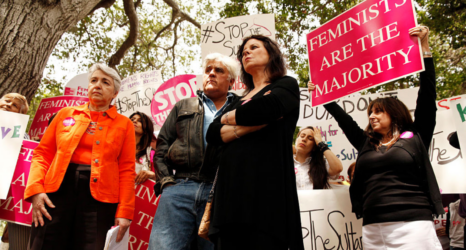
A series of whiplash-inducing legal twists and turns taking place in Texas courtrooms and briefing rooms the last few weeks has confused, frustrated and energized abortion advocates across the nation.
This back-and-forth is, at the least, bewildering for those of us trying to follow the news—but it’s deadly for those seeking time-sensitive access to safe reproductive care in this historically abortion-hostile state.
Having trouble keeping up with the latest in the battle for abortion access in Texas? Below, we break down the feminist fight for the right to a safe abortion, starting in late March.
On March 22, Governor Greg Abbott issued an executive order banning non-essential medical procedures during the COVID-19 pandemic in order to free up hospital beds for patients and personal protective equipment (PPE) for those on the frontlines of the public health crisis.
The next day, March 23, Texas’s attorney general Ken Paxton issued a press release interpreting Abbott’s order to bar any type of abortion that is “not medically necessary to preserve the life or health of the mother”—and stating that violators faced a $1,000 fine, 180 days in prison, and a revocation of their medical license.
On March 25, Planned Parenthood and other reproductive health clinics in Texas filed a lawsuit, arguing that abortion is an essential and time-sensitive procedure and that the governor’s order imposed an “undue burden” on the constitutional right to abortion access. The clinics asked the court to block the ban.
On March 30, a federal court ruled in favor of abortion providers and granted a temporary restraining order to allow abortion procedures to continue during the pandemic.
Judge Lee Yeakel wrote:
“Plaintiffs’ patients will suffer serious and irreparable harm in the absence of a temporary restraining order. The attorney general’s interpretation of the Executive Order prevents Texas women from exercising what the Supreme Court has declared is their fundamental constitutional right to terminate a pregnancy before a fetus is viable.”
The next day, on March 31, the 5th Circuit Court of Appeals issued a stay of the temporary restraining order—again allowing Governor Abbott’s executive order to halt abortion services.
On April 7, the 5th Circuit ruled that the district court should not have granted emergency relief to abortion providers and upheld the ban.
On April 9, the federal district court granted a second temporary restraining order against Governor Abbott’s executive order, allowing providers to perform abortions on those who would be unable to obtain an abortion before reaching 20 weeks, and also allowing them to provide medication abortion. The judge determined that providing medication abortion does not require the use of any PPE. He also determined that the inability to obtain abortion care in Texas as a result of the executive order was causing individuals with unwanted pregnancies to travel by car and airplane to places as far away as Colorado and Georgia, increasing their risk of contracting COVID- 19.
On April 10, the 5th U.S. Circuit Court of Appeals reversed the district’s court ruling, granting another stay and enforcing the COVID-19 abortion ban, with the exception of those who would be unable to access abortion services before they reach 20 weeks due to the ban.
On April 11, abortion providers asked for emergency intervention from the U.S. Supreme Court to allow abortion services while the case continues to be litigated.
On April 13, the 5th U.S. Circuit Court of Appeals ruled that pregnant women may still access medication abortion despite the abortion ban.
Judge James L. Dennis wrote that Texas’s attempt to ban medication abortion “… is a strong indication that the enforcement is pretextual and does not bear a ‘real or substantial relation’ to the public health crisis we are experiencing.”
As a result, abortion providers withdrew their request to the Supreme Court.
On April 17, Gov. Abbott issued a new executive order extending the ban on non-essential procedures until May 8.
On April 20, the 5th Circuit Court of Appeals reversed course and ruled that the state may ban medication abortion—and other abortion procedures—as it sought to slow the use of masks, gowns and other protective medical gear.
In a 2-1 decision, the majority said that “the constitutional right to abortion does not include the right to the abortion method of the woman’s (or the physician’s) choice” and that clinics had not proven that PPE would not be used during an examination of a woman seeking a medication abortion.
On April 22, Texas Attorney General Ken Paxton Texas stated that abortion is now exempt from the ban on non-essential procedures under Governor Abbott’s new executive order.
Both medication and procedural abortion are now available in Texas.
he coronavirus pandemic and the response by federal, state and local authorities is fast-moving. During this time, Ms. is keeping a focus on aspects of the crisis—especially as it impacts women and their families—often not reported by mainstream media. If you found this article helpful, please consider supporting our independent reporting and truth-telling for as little as $5 per month.





